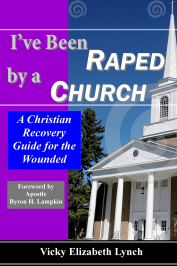 I have received some interesting and controversial comments about one of the new books that Conquest Publishers recently released. The book is entitled, “I’ve Been Raped by a Church: A Christian Recovery Guide for the Wounded.” The book chronicles author Vicky Lynch’s experiences with church pastoral abuse and gives biblical how-to advice to the reader about dealing with it.
I have received some interesting and controversial comments about one of the new books that Conquest Publishers recently released. The book is entitled, “I’ve Been Raped by a Church: A Christian Recovery Guide for the Wounded.” The book chronicles author Vicky Lynch’s experiences with church pastoral abuse and gives biblical how-to advice to the reader about dealing with it.
The comments focused mostly on the title of the book (one person commented without even reading the book). The gist of the comments is that the use of the word “rape” in the title is troubling, especially since the book is not discussing sexual rape that takes place in church.
It is true that the commonly accepted meaning of the word “rape” is forcible sexual assault, an act that is violent, unwarranted, illegal, and causes physical and psychological harm. However, the spiritual and psychological damage that can occur with pastoral and church abuse is just as devastating as sexual rape, and gives credence to the use of the word “rape” as a metaphor for church abuse.
In some churches, the pastor or bishop is purported to be the representative of God in the life of that local assembly. The pastor may be just as vital to the local church as the pope is to the Catholic church. Church members often greatly honor, highly respect, and unequivocally trust their pastor. The pastor becomes heavily invested in the lives of his or her members, and vice versa. On matters of spiritual significance, the pastor becomes the final authority. The pastor becomes like a parent to them, and they like sons and daughters to the pastor. The pastor may not be God, but to local church members, he or she is about as close as you can get.
There are many church pastors who have this level of influence over their flock, and they use it with humility, govern in love, and seek only to bring their members into the potential that God has for them. But there are others who, unwittingly or not, use this influence to abuse and misuse their members. And because of the spiritual and psychological connection that exists between the pastor and church members, such abuse can —and often is—just as damaging as the spiritual and mental effects of sexual rape.
One can argue that an abused church member can always voluntarily leave the church, and thus avoid the abuse, while a rape victim does not have that choice. But abused church members often find it difficult to leave. Members that are heavily connected to their pastors often believe that God is speaking through them, and if they leave, they are dishonoring the pastor, and consequentially, dishonoring God. So, they will subject themselves to this dysfunctional relationship, believing that God will punish them if they sever the bond. For devout Christians who live each day to love and serve God, leaving the church and God’s representative is not an option. It is as if the pastor is holding a figurative gun to their heads and demanding that they stay, or else.
Therefore, as shocking and pointed as the word “rape” is, I believe the word is appropriate to describe the experience of a church member who has been subject to an unloving and abusive pastor and those who support that pastor. What do you think?
Louis N Jones
louisnjones.com
